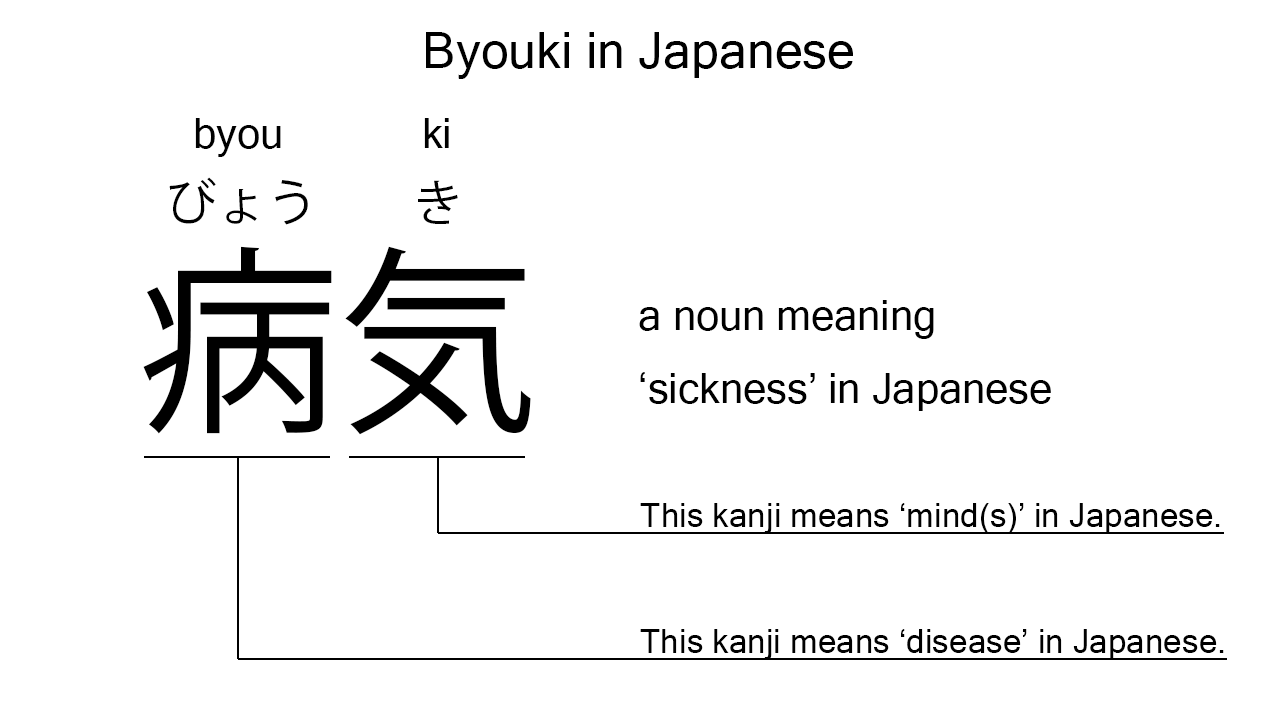What does “byouki” mean in Japanese?
Native speakers say “byouki” often to mean ‘sickness’ in Japanese. Perhaps, some Japanese learners know this word as it is sometimes used in Japanese conversations. In this blog post, however, I will explain this word in detail based on its kanji expression. And also, I will explain how to use it through example sentences. My explanations would help Japanese learners understand “byouki” more clearly. Then, let’s get started!
Contents
Definition and meanings of “byouki”
Let me start with the definition and meanings of “byouki”.
- byouki – 病気 (びょうき) : a noun meaning ‘sickness’, ‘illness’, or ‘disease’ in Japanese.
Native speakers use this noun to refer to the state of being sick, ill, or unhealthy. They sometimes use this even like an adjective to mean ‘sick’, ‘ill’, or ‘unhealthy’. So, this Japanese noun is more flexible than the English ones are.
The definition and meanings are not that difficult, I think. To understand this noun more clearly, however, let me explain its kanji characters in detail, one by one.
Byouki in kanji
The kanji expression of “byouki” consists of the following two kanji characters:
- 病 : a kanji character used to mean ‘disease’, ‘sickness’, or ‘illness’ in Japanese. This can also be found in other words like “byouin“.
- 気 : a kanji character used to mean ‘mood’, ‘mind’, ‘feeling’, or such in Japanese.
These two kanji characters tell us that “byouki” literally means ‘disease and mind’ in Japanese. This literal interpretation is not completely in line with the actual meanings, but still understandable, I think. Probably, it implies the effect of a diseased mind on the whole-body health.

When we meet new kanji expressions, we should check their kanji characters in detail to understand their meanings clearly and deeply. In many cases, kanji characters tell us a lot about the meanings of the expressions they form. Actually, here, we could get the better understanding of “byouki” through the detailed kanji check above.
So far, I’ve explained the definition and meanings of “byouki” together with its kanji characters. Then, let me explain how to use it through the example sentences below.
Example #1: how to say “sick” in Japanese
kanojo wa byouki ni nat ta – 彼女は病気になった (かのじょはびょうきになった)
She became sick.
Below are the new words used in the example sentence.
- kanojo – 彼女 (かのじょ) : a pronoun meaning ‘she’ in Japanese.
- wa – は : a binding particle working as a case marker or topic marker. In the example, this works after “kanojo” to make the subject in the sentence.
- ni – に : a case particle used to say what state or condition someone is in after a change or action. In the example, this is used after “byouki” to indicate the specific condition in which she is.
- nat – なっ : one conjugation of the verb, “naru”, which means ‘to become’, ‘to get’, or ‘to turn’ in Japanese. In the example, it has been conjugated for the better connection with its following word.
- ta – た : an auxiliary verb used after a verb, adjective, or auxiliary verb to make its past tense form. Probably, this is well known as a part of Japanese ta form. In the example, this is used after “nat” to make its past tense form, “nat ta”.
This is a typical usage of “byouki”. In this example, it works as a part of the commonly-used phrase, “byouki ni nat ta”, which means ‘to have become sick’ in Japanese. This phrase should be learnt together with its present tense form, “byouki ni naru”.
Example #2: another usage of “byouki”
boku mo byouki desu – 僕も病気です (ぼくもびょうきです)
I’m sick, too.
Below are the new words used in the example sentence.
- boku – 僕 (ぼく) : a pronoun meaning ‘I’ in Japanese. This is used mainly by boys and young males.
- mo – も : a binding particle making the subject word or the object word in a sentence with adding the meaning of ‘too’, ‘also’, or ‘as well’. In the example, this works after “boku” to make the subject in the sentence with adding the meaning of ‘too’.
- desu – です : an auxiliary verb used after a noun or adjective to make it polite. Probably, this is well known as a part of Japanese desu form. In the example, this is used after “byouki” to make it sound polite.
This is another typical usage of “byouki”. In this example, it works more like an adjective and becomes the complement in the sentence. When we want to refer to the state of being sick or sickness itself in Japanese, anyway, this noun is a very good option.
Summary
In this blog post, I’ve explained the definition and meanings of “byouki” in detail based on its kanji expression. And also, I’ve explained how to use it through the example sentences. Let me summarize them as follows.
- byouki – 病気 (びょうき) : a noun meaning ‘sickness’, ‘illness’, or ‘disease’ in Japanese. Native speakers use this noun to refer to the state of being sick, ill, or unhealthy. They sometimes use this even like an adjective to mean ‘sick’, ‘ill’, or ‘unhealthy’. So, this Japanese noun is more flexible than the English ones are. These two kanji characters literally mean ‘disease and mind’ in Japanese. This literal interpretation is not completely in line with the actual meanings, but still understandable, I think. Probably, it implies the effect of a diseased mind on the whole-body health.
Hope my explanations are understandable and helpful for Japanese learners.